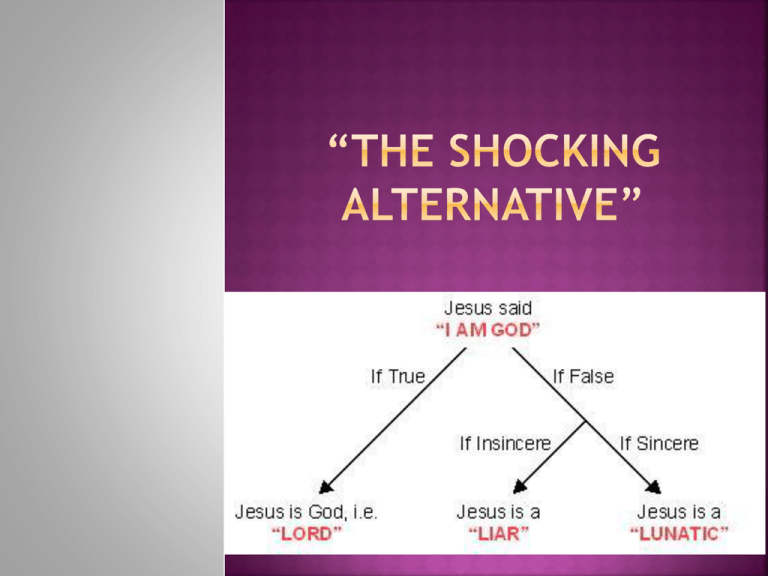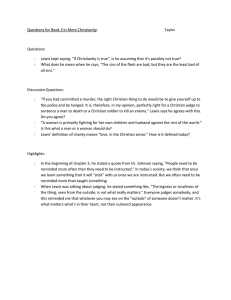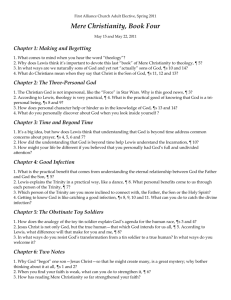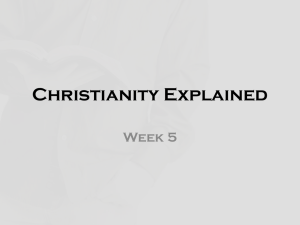
Stephen
Arterburn, author of more than
thirty books, including Every Man’s Battle:
“Showed me that most of what I had been
taught about what a Christian is and is not
was not true.”
Steve Brown, author of Approaching God,
seminary professor
Bryan Chapell, president of Covenant
Seminary, St. Louis: “Lewis’s thoughtful and
sensitive defense of Christianity resonated
with the faith needs of my teen years.”
Lyle
Dorsett, editor of The Essential C. S.
Lewis: “Was instrumental in my conversion to
faith in Jesus Christ as Savior and Lord.”
Ted W. Engstrom, president emeritus of
World Vision: “This is a basic treatise on the
Christian faith, which is wonderfully
profound in its simplicity.”
Gordon D. Fee, professor of New Testament,
Regent College: “Helped me realize that a
burning heart did not necessarily mean one
had to have a pumpkin for a head.”
George
Gallup, Jr. pollster: “Brought me a
heart-stopping awareness, when I was a
student at Princeton, that Christianity is a
religion of the head as well as the heart, and
that our hope is not in finding ourselves, but
in losing ourselves—in God.”
John Guest, pastor of Christ Church at Grove
Farm: “Lewis’s clear thinking about the
relativism he saw advancing, and his
giftedness at making relativism look ‘silly,’
helped me challenge such silliness—and
thereby make the gospel all the more
relevant.”
Peter
Kreeft, Boston College philosopher:
“The reader emerges with not only
knowledge, but wisdom.”
Woodrow Kroll, president of Back to the
Bible: “Lewis makes sense when he states
the case for Christianity. It was compelling
the first time I read it; it remains compelling
today.”
Kevin Leman, author of Sex Begins in the
Kitchen and The New Birth Order Book:
“After reading this book, I realized what
God’s grace means.”
Alister McGrath, professor of historical theology,
Oxford University
Rebecca Manley Pippert, author of Out of the
Salt Shaker: “In Lewis I found myself face-toface with an intellect so disciplined, so lucid, so
relentlessly logical, that all my intellectual pride
at not being a ‘mindless believer’ was quickly
squelched.”
Cornelius Plantinga Jr., president of Calvin
Theological Seminary: “Who else so wonderfully
combines sharp thinking, soaring theological
imagination, and noble simplicity?”
Leland
Ryken, editor of The Christian
Imagination: “Helped to codify my thinking
about Christian belief and practice during my
college years.”
All
testimonies from Indelible Ink: 22
Prominent Christian Leaders Discuss the
Books that Shape Their Faith. Scott Larsen,
senior editor.
Mere
Christianity
Book II: What
Christians Believe,
Chapter 3
The
Principal of Manchester College at
Oxford University, Nicol Cross, a Unitarian,
didn’t like the logic of Lewis in one of his
talks.
Cross called himself a Unitarian—a creed
sometimes defined as “one God, no devil,
and twenty shillings in the pound.”
Cross wanted to believe that Jesus was a
good man, but nothing more.
He
said at a meeting of the Socratic Club on
November 11, 1946 that “he must allude to
the ‘vulgar nonsense’ that ‘a man who said
the things that Jesus said, and was not God
would be either a lunatic or a devil.’”
He said that this represented such a
simplification of the possibilities as only a
naïve person could perpetrate, who
combined a triple ignorance of New
Testament criticism, of psychology, and of
elementary logic.
Oh, really?
He
was quoting Lewis’s BBC address, entitled
“The Shocking Alternative,” first delivered
on Feb. 1, 1942, an address that later
became Chapter Three of Book Two in Mere
Christianity. Elton Trueblood, professor of
philosophy and chaplain at both Stanford
University and Earlham College, had a much
different and more accurate perspective on
this most powerful chapter:
“In
reading Lewis I could not escape the
conclusion that the popular view of Christ as
being a Teacher, and only a Teacher, has
within it a self-contradiction that cannot be
resolved. I saw, in short, that conventional
liberalism cannot survive rigorous and
rational analysis.” (Elton Trueblood, While It
Is Day: An Autobiography, 99)
Read “only a Teacher” as “a good man, but
nothing else.”
There
is a Prince of this World, an evil power.
An analogy on Free Will from the home.
God created us with Free Will.
God thought it worth the risk.
The better the creature the better if it goes
right, but also the worse if it goes wrong.
The Dark Power went wrong by wanting to be
in the center, wanting to be God, which is
what our first sin was.
God made us to run on Himself, which is why
we will never be happy without God.
People
and civilizations have a flaw.
God did three things to solve this problem:
Conscience
Good dreams
The Jews
One
of the Jews talks as if He were God; He
claims to forgive sins.
Jesus “behaved is if He was the party chiefly
concerned.”
If Jesus were just a man, He wouldn’t act
this way.
He is Lord, liar, or lunatic.
We
can all understand how a man forgives
offences against himself. You tread on my
toe and I forgive you, you steal my money
and I forgive you. But what should we make
of a man, himself unrobbed and untrodden
on, who announced that he forgave you for
treading on other men’s toes and stealing
other men’s money? Asinine fatuity is the
kindest description we should give of his
conduct. Yet this is what Jesus did.
He
told people that their sins were forgiven,
and never waited to consult all the other
people whom their sins had undoubtedly
injured. He unhesitatingly behaved as if He
was the party chiefly concerned, the person
chiefly offended in all offences. This makes
sense only if He really was the God whose
laws are broken and whose love is wounded
in every sin.
Educated
in the medieval Trivium, which is …
Grammar
Logic
Rhetoric
Logic
is considered to be “the enquiry into
the principles of valid thought” or “the study
of the principles of valid thinking.” (Prof. H.
A. Hodges)
It is the foundation of philosophy.
The context of this
story in The Lion, the
Witch and the
Wardrobe.
The three options for
Lucy.
“Logic!” said the
Professor half to
himself. “Why don’t
they teach logic at
these schools? There
are only three
possibilities.”
“Either your sister is
telling lies, or she is
mad, or she is telling
the truth. You know
she doesn’t tell lies
and it is obvious that
she is not mad. For
the moment then and
unless any further
evidence turns up, we
must assume that she
is telling the truth.”
I
am trying here to prevent anyone saying the
really foolish thing that people often say
about Him: “I’m ready to accept Jesus as a
great moral teacher, but I don’t accept His
claim to be God.” That is the one thing we
must not say. A man who was merely a man
and said the sort of things Jesus said would
not be a great moral teacher. He would
either be a lunatic—on a level with the man
who says he is a poached egg—or else he
would be the Devil of Hell.
You
must make your choice. Either this man
was, and is, the Son of God: or else a
madman or something worse. You can shut
Him up for a fool, you can spit at Him and
kill Him as a demon; or you can fall at His
feet and call Him Lord and God. But let us
not come with any patronizing nonsense
about His being a great human teacher [a
good man]. He has not left that open to us.
He did not intend to.












